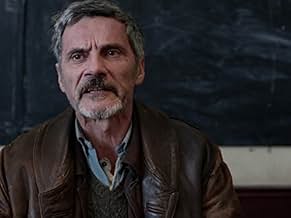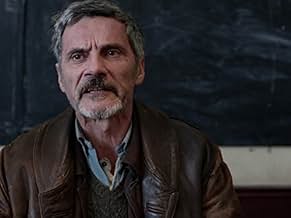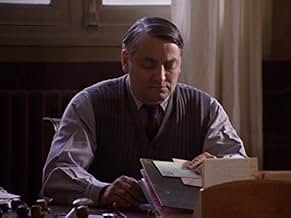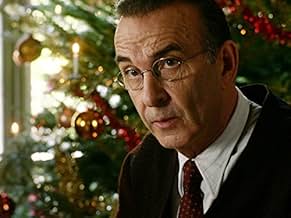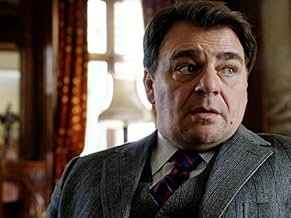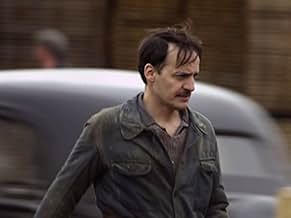Adicionar um enredo no seu idiomaTraces the experiences of various residents of a fictional small village just inside the occupation zone during WWII. Deals with issues including collaboration, the Resistance, the fate of F... Ler tudoTraces the experiences of various residents of a fictional small village just inside the occupation zone during WWII. Deals with issues including collaboration, the Resistance, the fate of French Jews, and war profiteering.Traces the experiences of various residents of a fictional small village just inside the occupation zone during WWII. Deals with issues including collaboration, the Resistance, the fate of French Jews, and war profiteering.
- Prêmios
- 2 vitórias e 10 indicações no total
Explorar episódios
Avaliações em destaque
This is the Most extraordinary show I've ever seen in my 60 year life. The depth and evolution of the characters is flawless. The pain and guilt of the occupation is palpable and touched me in ways I never anticipated. While the show was wrenching at times to watch, I can't imagine a better rendition of such a painful and revelatory experience.
I can't recommend enough!
Postscript: Since finishing the series and writing this review, I've been searching for one word to describe the experience of Un Village Français....The word is haunting...
I can't recommend enough!
Postscript: Since finishing the series and writing this review, I've been searching for one word to describe the experience of Un Village Français....The word is haunting...
This is a truly remarkable, riveting, and even addictive TV series, certainly one of the best I have ever seen, regardless of language. (I'm 64. I've seen a lot of TV series.) What makes it remarkable? The acting is uniformly first-rate, the direction very good, the script even better than first-rate. Each episode holds you from the get-go, and many end with cliff-hangers that make you want to start the next episode. As I said, it is downright addicting.
Are there any flaws? I don't know that I would call them flaws, but I can see that those interested in the history of the Occupation in France could have several issues with the series.
1) A previous reviewer wrote that it is an "Excellent TV show explaining the life of ordinary people in Nazi occupied France." Not really true. The main French characters are almost all members of the haute bourgeoisie: a leading doctor, a factory manager, the chief of police, etc. They do not deal with the issues that friends of mine remember from the Occupation: the shortage of everything, starting with food and fuel to heat homes. For ordinary French people, the Occupation was four years of waiting in line every day for bare necessities, punctuated by an occasional dramatic event. That wouldn't make for good TV drama, though, so this series has made the dramatic more "common" than it evidently was in the life of the average French person. The episodes almost all focus on dramatic events. It makes for riveting viewing, certainly, but it gives a skewed view of daily life during the Occupation.
2) Much of the focus is on sex and marital infidelity, rather than issues specific to the Occupation. (It reminds me a lot of Zola's Germninal in that sense.) This holds audiences, certainly, but there is nothing particularly related to the Occupation here. Almost all the wives turn out to be unfaithful to their husbands. I'm not sure how a feminist would react to that, or indeed many French women, faithful to their husbands or boyfriends, who lived through the era.
3) The depiction of the Communist Party leaders is uniformly negative. Again, the focus seems to be very bourgeois, very much Gaulliste. I noticed, for example, that when others, even Gaullistes like Bériot, refer to the Communists as Bolsheviks, that just gets translated as Communist. There is, of course, a big difference there. It is very true that many non-Communists feared the Communist Resistance and feared that their goal was to lead France into another class war/revolution, but that was not in fact the goal of all the FTP/Communist resistants.
All that said, I repeat that this is a riveting series. You will not regret watching it - except that you may well become addicted to it.
-----------------
I have now watched through the end of Season 6, which is as far as the American distribution has gone as of January 2017. (Season 7 is announced for mid-February.) All I have to add to what I wrote above is that this series does a remarkable job of making all the lead characters, no matter what their political position, very human and very three-dimensional. No one is all bad, and virtually no one is all good. That becomes very problematic for me in the case of the Militiamen and some of the Germans, the SS and the Gestapo. I don't like feeling sympathy or compassion for individuals who have committed monstrous crimes, as some of these characters do. Nevertheless, I will concede that even someone who can shoot two little children in cold blood - that is a VERY difficult scene to watch - might also have human qualities. I don't like conceding that, but I will.
The end of episode 12 of Season 6 turned my blood cold. It focused on some of the worst events of the Liberation, and made it anything but a joyous event. I know, having interviewed people who lived in a small town in France at that time, that what is described did indeed take place across France. Some of it is even toned down, like the shearing of the women accused of collaboration with the Germans. Still, it is a particularly somber note on which to end the penultimate season.
Are there any flaws? I don't know that I would call them flaws, but I can see that those interested in the history of the Occupation in France could have several issues with the series.
1) A previous reviewer wrote that it is an "Excellent TV show explaining the life of ordinary people in Nazi occupied France." Not really true. The main French characters are almost all members of the haute bourgeoisie: a leading doctor, a factory manager, the chief of police, etc. They do not deal with the issues that friends of mine remember from the Occupation: the shortage of everything, starting with food and fuel to heat homes. For ordinary French people, the Occupation was four years of waiting in line every day for bare necessities, punctuated by an occasional dramatic event. That wouldn't make for good TV drama, though, so this series has made the dramatic more "common" than it evidently was in the life of the average French person. The episodes almost all focus on dramatic events. It makes for riveting viewing, certainly, but it gives a skewed view of daily life during the Occupation.
2) Much of the focus is on sex and marital infidelity, rather than issues specific to the Occupation. (It reminds me a lot of Zola's Germninal in that sense.) This holds audiences, certainly, but there is nothing particularly related to the Occupation here. Almost all the wives turn out to be unfaithful to their husbands. I'm not sure how a feminist would react to that, or indeed many French women, faithful to their husbands or boyfriends, who lived through the era.
3) The depiction of the Communist Party leaders is uniformly negative. Again, the focus seems to be very bourgeois, very much Gaulliste. I noticed, for example, that when others, even Gaullistes like Bériot, refer to the Communists as Bolsheviks, that just gets translated as Communist. There is, of course, a big difference there. It is very true that many non-Communists feared the Communist Resistance and feared that their goal was to lead France into another class war/revolution, but that was not in fact the goal of all the FTP/Communist resistants.
All that said, I repeat that this is a riveting series. You will not regret watching it - except that you may well become addicted to it.
-----------------
I have now watched through the end of Season 6, which is as far as the American distribution has gone as of January 2017. (Season 7 is announced for mid-February.) All I have to add to what I wrote above is that this series does a remarkable job of making all the lead characters, no matter what their political position, very human and very three-dimensional. No one is all bad, and virtually no one is all good. That becomes very problematic for me in the case of the Militiamen and some of the Germans, the SS and the Gestapo. I don't like feeling sympathy or compassion for individuals who have committed monstrous crimes, as some of these characters do. Nevertheless, I will concede that even someone who can shoot two little children in cold blood - that is a VERY difficult scene to watch - might also have human qualities. I don't like conceding that, but I will.
The end of episode 12 of Season 6 turned my blood cold. It focused on some of the worst events of the Liberation, and made it anything but a joyous event. I know, having interviewed people who lived in a small town in France at that time, that what is described did indeed take place across France. Some of it is even toned down, like the shearing of the women accused of collaboration with the Germans. Still, it is a particularly somber note on which to end the penultimate season.
It always sounds really good to take a big, historical event and tell the story through the lens of a handful (or in this case a couple of dozen) characters. It is much harder to execute and more often than not the execution disappoints.
This is the exception. Un Village Francais is a masterful telling of the history of WWII France through the lens of a small village. Those who know their history know that France had a unique history during WWII as they neither remained fully free nor were they entirely occupied by the Nazis.
The show explores all of those dynamics, the naivete of the early German occupation (a reaction that makes sense in the context of a continent whose entire history is built around countries constantly coveting the land of others and seemingly constant wars), the problems that came with the full-on German occupation and the series even lasted long enough to explore the important and timeless themes raised in a post-war France.
The cast is top-notch, the drama is constant and the character arcs over the 7 seasons are almost unbelievable. As war would transform anybody, these characters by the end are almost unrecognizable from how they began.
It is one of the greatest television shows of all time.
This is the exception. Un Village Francais is a masterful telling of the history of WWII France through the lens of a small village. Those who know their history know that France had a unique history during WWII as they neither remained fully free nor were they entirely occupied by the Nazis.
The show explores all of those dynamics, the naivete of the early German occupation (a reaction that makes sense in the context of a continent whose entire history is built around countries constantly coveting the land of others and seemingly constant wars), the problems that came with the full-on German occupation and the series even lasted long enough to explore the important and timeless themes raised in a post-war France.
The cast is top-notch, the drama is constant and the character arcs over the 7 seasons are almost unbelievable. As war would transform anybody, these characters by the end are almost unrecognizable from how they began.
It is one of the greatest television shows of all time.
"Un village français" is one of these rare TV series which suck you in through realistic plots mixing suspense, love, betrayal without being sensationalist, and staying simple (although the numerous love triangles are a little too much at times). French TV being filled with painfully mediocre, if not absolutely bad series, "Un village français" stands out as the best one out there, by far.
The realism of it is one of the factors which make it great. The actors are superb, their characters genuine, the women beautiful in a classy way (not tasteless bombshells), and the plots explore simple people's decisions during the hard circumstances of the Occupation, without ever openly judging their acts.
The series starts kind of slow. I'd say the first season is the weakest yet, even though it has the ultimate spectacular scenes when the German army takes control of the village. The series only gets better as the viewer is more familiar with each character, and follows their individual paths, their interactions, their fears and decisions. It takes its time. It doesn't rush into the events of the Occupation, and rather presents the slow evolution of French Collaboration as things get harsher and more fixed, and the characters ultimately need to find themselves and chose their definite side, or remain torn.
As said before, "Un village français" doesn't judge, staying remarkably neutral when possible, not opting for an easy manichean presentation of the Occupation. Many characters turned collaborators are not bad people and even try to do good, like the mayor of the village, or one young woman who has an affair with a German soldier. Even the young chief of police (Jean Marchetti) is likable. As I'm writing this, the series is only in its fourth season, so I can't wait to see how these characters will be treated in the last season which will presumably depict the Liberation. Hopefully, it will continue to show the harsh reality (I'm expecting head shavings, trials, public dishonor, executions, escapes and pardons... the characters are so diverse that each fates are possible).
A great TV series, which I highly recommend to those who have a chance to see it.
The realism of it is one of the factors which make it great. The actors are superb, their characters genuine, the women beautiful in a classy way (not tasteless bombshells), and the plots explore simple people's decisions during the hard circumstances of the Occupation, without ever openly judging their acts.
The series starts kind of slow. I'd say the first season is the weakest yet, even though it has the ultimate spectacular scenes when the German army takes control of the village. The series only gets better as the viewer is more familiar with each character, and follows their individual paths, their interactions, their fears and decisions. It takes its time. It doesn't rush into the events of the Occupation, and rather presents the slow evolution of French Collaboration as things get harsher and more fixed, and the characters ultimately need to find themselves and chose their definite side, or remain torn.
As said before, "Un village français" doesn't judge, staying remarkably neutral when possible, not opting for an easy manichean presentation of the Occupation. Many characters turned collaborators are not bad people and even try to do good, like the mayor of the village, or one young woman who has an affair with a German soldier. Even the young chief of police (Jean Marchetti) is likable. As I'm writing this, the series is only in its fourth season, so I can't wait to see how these characters will be treated in the last season which will presumably depict the Liberation. Hopefully, it will continue to show the harsh reality (I'm expecting head shavings, trials, public dishonor, executions, escapes and pardons... the characters are so diverse that each fates are possible).
A great TV series, which I highly recommend to those who have a chance to see it.
Un village français is a seven season revelation. Though it appears to be a story about people, it's really an allegorical tale about a nation. Each character represents a segment of the population that either lived through or was directly affected by the German occupation of France from 1940 through 1944. The hapless, the hopeless, the connivers, the accommodators, the victims and even those who embraced the NAZI ideology are all here in human form. As their story unfolds we learn...in vary nuanced lessons...that huge forces that rip away all that moors society and each of us to each other can't be summed up in a phrase or a song. That there's devastation, pain, denial, guilt and even redemption awaiting all of us when evil becomes authority. Other reviewers will tell you the story. But in truth Un village français is much more. And so well done that it might be the best thing ever to appear on the small screen. Watch it.
Você sabia?
- CuriosidadesThe town depicted in the series, Villeneuve, is fictional.
- Erros de gravaçãoIn a first-season episode set during 1940, a German soldier is shown wearing the Close Combat Clasp, a decoration which first began to be awarded in November, 1942.
- ConexõesReferenced in Séries express: Episode #2.30 (2009)
Principais escolhas
Faça login para avaliar e ver a lista de recomendações personalizadas
Detalhes
- Data de lançamento
- País de origem
- Central de atendimento oficial
- Idioma
- Também conhecido como
- A French Village
- Empresas de produção
- Consulte mais créditos da empresa na IMDbPro
- Tempo de duração52 minutos
- Cor
- Proporção
- 1.78 : 1
Contribua para esta página
Sugerir uma alteração ou adicionar conteúdo ausente

![Assistir a Bande-annonce Saison 1 [OV]](https://m.media-amazon.com/images/M/MV5BYjJkN2E2M2QtNjgyZS00NTVjLThlYzMtNjBlM2QxZTMxODMwXkEyXkFqcGdeQXRodW1ibmFpbC1pbml0aWFsaXplcg@@._V1_QL75_UX500_CR0)
